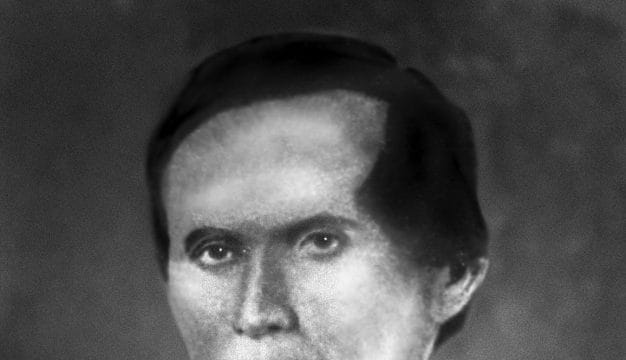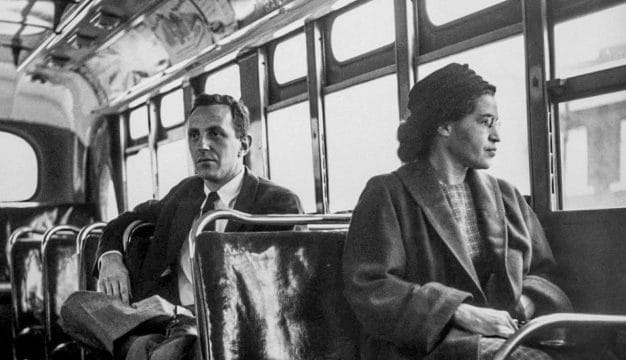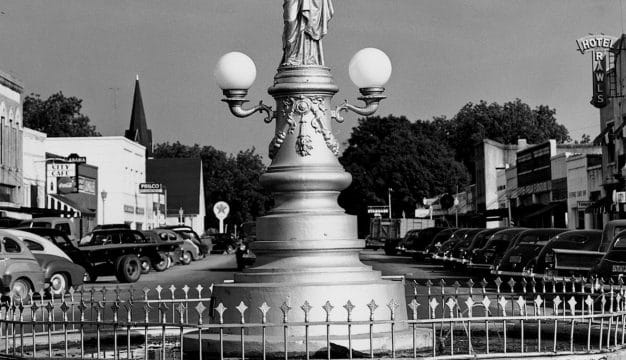David Satcher
Anniston native David Satcher (1941- ) is noted for serving as Surgeon General of the United States and as Assistant Secretary for Health for the U.S. Department of Health and Human Services. He is best known for his advocacy for health care in underserved communities and his civil rights activism in the field of medicine. Satcher is one of three Alabama physicians to serve as surgeon general, along with Luther Terry and Regina Benjamin.
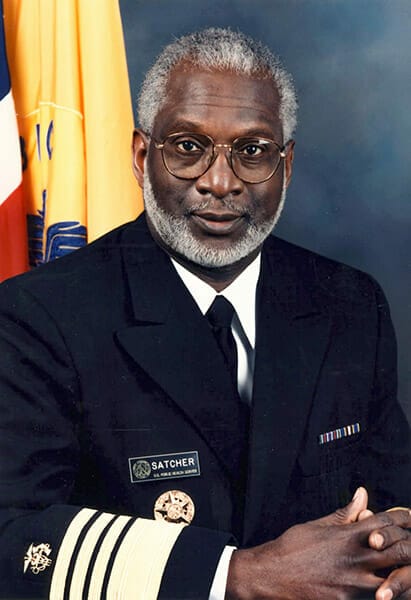 David Satcher
Satcher was born in Anniston, Calhoun County, on March 2, 1941, to Wilmer and Anne Satcher. He graduated from Morehouse College, in Atlanta, Georgia, with honors in 1963 with a bachelor of science degree and matriculated in the School of Medicine at Case Western Reserve University in Cleveland, Ohio. There, he was one of four African American students in the entire school and the first to obtain both an M.D. and Ph.D. from the School of Medicine, with honors, in 1970. He honed his future leadership skills there and was active in advocating for social justice. Satcher helped convince the administration to recruit minority students and personally recruited them himself. His leadership in diversity and equity in patient care as a student at Case Western Reserve in the 1960s was honored in 1991 with a Visiting Minority Medical Student Clerkship at University Hospitals Case Medical Center in Cleveland, the primary teaching hospital of Case Western Reserve University.
David Satcher
Satcher was born in Anniston, Calhoun County, on March 2, 1941, to Wilmer and Anne Satcher. He graduated from Morehouse College, in Atlanta, Georgia, with honors in 1963 with a bachelor of science degree and matriculated in the School of Medicine at Case Western Reserve University in Cleveland, Ohio. There, he was one of four African American students in the entire school and the first to obtain both an M.D. and Ph.D. from the School of Medicine, with honors, in 1970. He honed his future leadership skills there and was active in advocating for social justice. Satcher helped convince the administration to recruit minority students and personally recruited them himself. His leadership in diversity and equity in patient care as a student at Case Western Reserve in the 1960s was honored in 1991 with a Visiting Minority Medical Student Clerkship at University Hospitals Case Medical Center in Cleveland, the primary teaching hospital of Case Western Reserve University.
Largely as a result of his advocacy, the Case Western School of Medicine began recruiting minority medical students and continues to be one of the top private medical schools in the nation with a significant minority student enrollment. Satcher’s strategic skills and analytical abilities were manifested through his efforts to raise awareness and cultural sensitivity among faculty who worked with underrepresented minorities. He initiated the inclusion of lectures regarding the needs of African American patients at this predominantly white institution and challenged faculty with data he acquired through questionnaires on perceptions of care by clinic patients, of whom more than 95 percent were African American. Many faculty members believed themselves to be empathetic and nondiscriminatory in their care of black patients until Satcher confronted them with data gathered from the patients. These data revealed very different perceptions on the part of patients, who expressed feelings of being disrespected, talked down to, and forced to wait inordinately long times for appointments. Although commonly used today, these studies were the first patient-experience feedback opportunities for most patients.
Satcher served as interim dean of the Charles R. Drew Postgraduate Medical School in Los Angeles from 1977 to 1979. During that time, he negotiated an agreement with the University of California at Los Angeles School of Medicine and the California Board of Regents that created an affiliation between the two institutions. This affiliation facilitated the accreditation of the Charles R. Drew Postgraduate School. He also directed the King/Drew Comprehensive Sickle Cell Center, also in Los Angeles, for six years. In 1979, Satcher returned to his alma mater, Morehouse College, and served as professor and chairman of the Department of Community Medicine and Family Practice at the Morehouse School of Medicine. In 1982, Satcher was appointed president of Meharry Medical College in Nashville, Tennessee. In 1993, he was appointed director of the federal government’s Centers for Disease Control and Prevention and administrator of the Agency for Toxic Substances and Disease Registry.
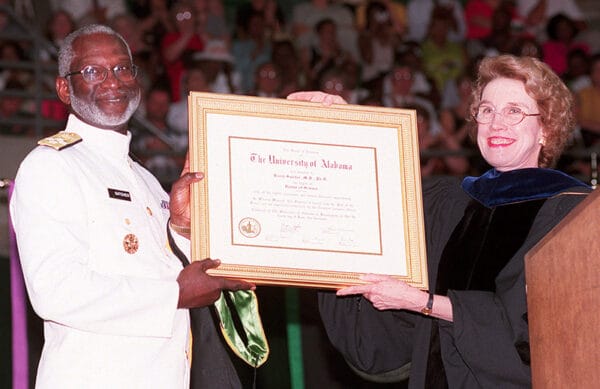 David Satcher at UAB
In February 1998, Satcher was appointed Surgeon General of the United States and Assistant Secretary for Health of the U.S. Department of Health and Human Services by Pres. William J. Clinton. Satcher was only the second individual up to that time to hold both posts simultaneously. As surgeon general, he coined the phrase “Elimination of Health Disparities.” For the first time, the federal government changed its focus from improving health disparities or diminishing health disparities to a determined effort to eliminate all differences among various U.S. populations in death rates from disease and trauma. As surgeon general, the nation’s top doctor, Satcher also strove to remove the stigma of mental illness and fought for equitable health care and health outcomes for all Americans. He left office in August 2002.
David Satcher at UAB
In February 1998, Satcher was appointed Surgeon General of the United States and Assistant Secretary for Health of the U.S. Department of Health and Human Services by Pres. William J. Clinton. Satcher was only the second individual up to that time to hold both posts simultaneously. As surgeon general, he coined the phrase “Elimination of Health Disparities.” For the first time, the federal government changed its focus from improving health disparities or diminishing health disparities to a determined effort to eliminate all differences among various U.S. populations in death rates from disease and trauma. As surgeon general, the nation’s top doctor, Satcher also strove to remove the stigma of mental illness and fought for equitable health care and health outcomes for all Americans. He left office in August 2002.
Satcher has been honored as a Robert Wood Johnson Clinical Scholar and Macy Faculty Fellow. He has received numerous awards and is a member of the Institute of Medicine. He served as interim president of Morehouse Medical College from 2004 to 2006 and in 2006 established the Satcher Health Leadership Institute at the Morehouse School of Medicine. In 2020, the organization partnered with the Centers for Disease Control to address the disproportionate number of deaths from COVID-19 among African Americans. The School of Medicine at Case Western Reserve named one of its academic societies, which guide medical students through their studies, after him. In 2013, Satcher co-founded the African American Network Against Alzheimer’s, which works to create a national effort to educate African Americans about Alzheimer’s and brain health and advocate for eradicating the disease, which is the fourth leading cause of death among Black Americans. The organization is a subgroup of US Against Alzheimer’s. He also sits on the boards of Johnson and Johnson and MetLife. He is married to Nola Satcher, a poet, with whom he has four children.
Throughout his adult life, David Satcher has advocated for social justice and health care for all Americans, especially the poor and those left out of mainstream medicine. He has advocated for healthy lifestyles and fought to remove the stigma of depression and mental illness and supports a single-payer healthcare system.
